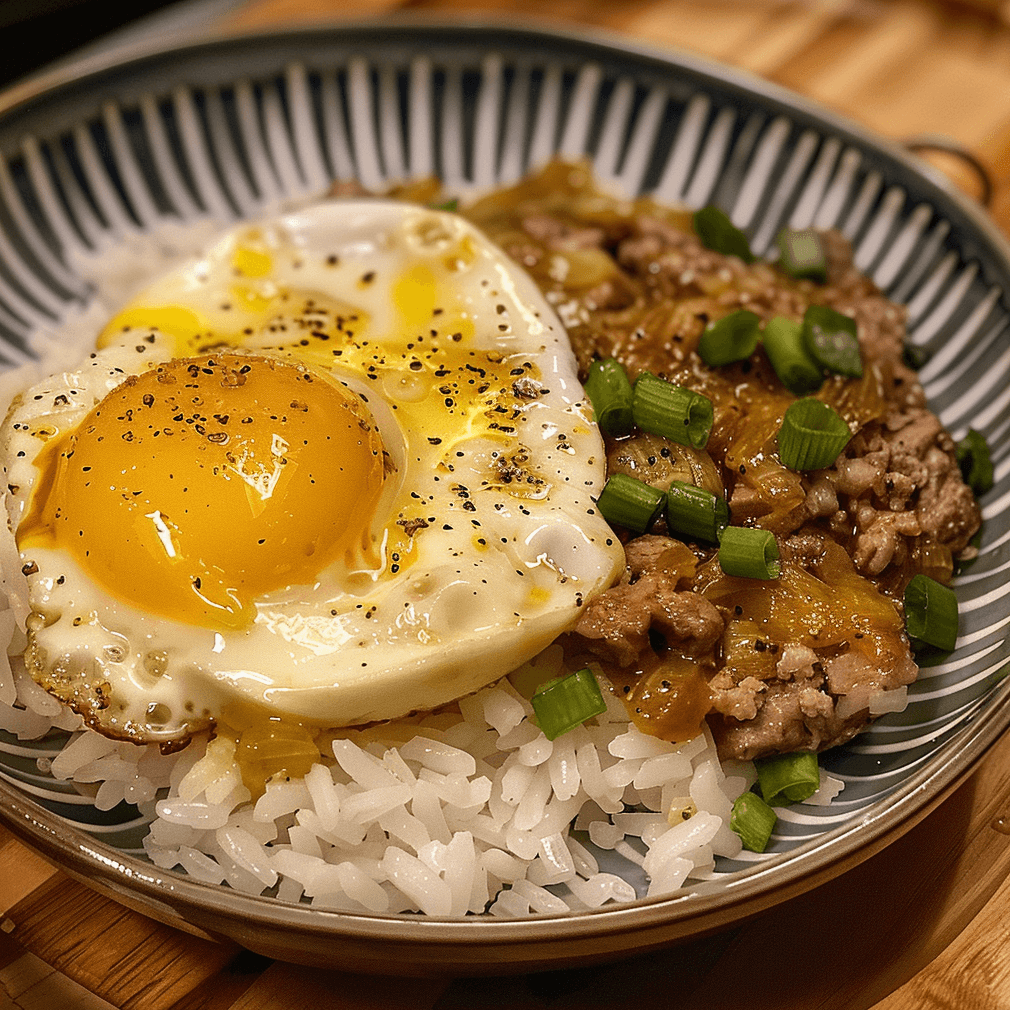Eggs, rice, and meat have been dietary staples for centuries, forming the backbone of many traditional meals worldwide. Their versatility, affordability, and nutritional value make them essential components of a well-balanced diet. But how do they work together to promote health, and what are the best ways to incorporate them into your meals?
This guide explores the health benefits, cultural significance, and best cooking methods for eggs, rice, and meat, helping you create a nutritious and delicious diet.
The Nutritional Value of Eggs, Rice, and Meat
Each of these foods provides essential nutrients that the body needs for optimal function.
-
Eggs are packed with high-quality protein, healthy fats, and vitamins like B12 and D.
-
Rice is an excellent source of carbohydrates, which provide energy, and brown rice adds fiber and essential minerals.
-
Meat offers complete proteins, iron, and B vitamins, crucial for muscle growth and energy.
Together, these three foods create a balanced meal with proteins, fats, and carbohydrates—everything your body needs to function efficiently.
Eggs: A Powerhouse of Nutrition
Eggs are one of the most nutrient-dense foods available.
Key Nutrients in Eggs:
-
Protein: Each egg contains about 6 grams of high-quality protein.
-
Vitamins: Rich in vitamins A, B12, D, and E.
-
Minerals: Provides iron, phosphorus, and selenium.
-
Healthy Fats: Contain omega-3 fatty acids for brain health.
Health Benefits of Eggs:
-
Promote muscle growth and recovery
-
Support brain and eye health
-
Help maintain healthy cholesterol levels (when eaten in moderation)
Rice: The Global Staple
Rice is a staple food for billions of people worldwide. It’s easy to digest, provides lasting energy, and pairs well with almost any protein source.
Types of Rice:
-
White Rice – Quick to cook but lower in fiber.
-
Brown Rice – High in fiber and nutrients, great for digestion.
-
Wild Rice – Packed with antioxidants and protein.
-
Basmati & Jasmine Rice – Fragrant varieties with lower glycemic indexes.
Nutritional Benefits of Rice:
-
Energy Source: A rich source of complex carbohydrates.
-
Digestion-Friendly: Especially in its whole-grain form.
-
Gluten-Free: Safe for those with gluten intolerance.
Meat: A Rich Source of Protein
Meat is a vital source of protein and essential nutrients. However, the type and quality of meat consumed can impact health.
Types of Meat:
-
Chicken: Lean and packed with protein.
-
Beef: Rich in iron and B vitamins.
-
Pork: Provides zinc and protein but can be high in fat.
-
Fish: Contains omega-3 fatty acids for heart and brain health.
Health Benefits of Meat:
-
Builds and repairs muscle tissue.
-
Supports immune function.
-
Provides essential amino acids that the body cannot produce.
Combining Eggs, Rice, and Meat for a Balanced Diet
When combined, these three foods provide a well-rounded meal with all the necessary macronutrients. Some great meal ideas include:
-
Breakfast: Scrambled eggs with brown rice and grilled chicken.
-
Lunch: Fried rice with eggs and beef stir-fry.
-
Dinner: Grilled fish with wild rice and a boiled egg.
The key is to balance protein, healthy fats, and fiber for a nutritious meal.
The Best Ways to Cook Eggs, Rice, and Meat
Cooking methods play a crucial role in preserving the nutrients and enhancing the flavors of eggs, rice, and meat. While these ingredients are versatile, certain techniques can maximize their health benefits while minimizing harmful effects.
Healthy Cooking Methods for Eggs
-
Boiled Eggs: Retain the most nutrients and are low in calories.
-
Scrambled Eggs: Best when cooked with minimal oil and no processed additives.
-
Poached Eggs: Cooked in water, avoiding unhealthy fats.
-
Omelets: Can be made healthier with vegetables and minimal cheese.
Healthy Ways to Cook Rice
-
Steaming or Boiling: The healthiest way to cook rice without excess oils.
-
Soaking Before Cooking: Reduces anti-nutrients and improves digestion.
-
Cooking with Bone Broth: Enhances the nutritional value and flavor.
Best Cooking Methods for Meat
-
Grilling: Helps retain protein while reducing fat content.
-
Baking or Roasting: Uses minimal oil and preserves nutrients.
-
Steaming or Boiling: Ideal for lean meats like chicken and fish.
-
Stir-Frying: Uses little oil and keeps meat tender and flavorful.
By avoiding deep-frying and excessive use of processed ingredients, you can keep your meals healthy and nutritious.
Cultural Significance of Eggs, Rice, and Meat
These three ingredients are staples in many cultures, forming the base of countless traditional dishes worldwide.
Popular Dishes from Around the World
-
Asia: Fried rice with eggs and meat (e.g., Chinese Yangzhou fried rice, Japanese Gyudon).
-
Latin America: Arroz con Pollo (chicken with rice) and Huevos Rancheros (eggs with rice and beans).
-
Africa: Jollof rice with chicken or beef, a staple in West African cuisine.
-
Europe: Spanish paella with seafood, eggs, and rice.
Each culture has unique methods of preparing these ingredients, showcasing their versatility and global appeal.
Eggs, Rice, and Meat in Weight Loss and Muscle Building
These foods can play a significant role in fitness and health, whether you are trying to lose weight or gain muscle.
For Weight Loss
-
Eggs: Low in calories and high in protein, keeping you full longer.
-
Rice: Brown rice is a great source of fiber and complex carbohydrates.
-
Meat: Lean meats like chicken and fish provide protein without excess fat.
For Muscle Building
-
Eggs: Contain high-quality protein and essential amino acids.
-
Rice: Provides energy for workouts and muscle recovery.
-
Meat: Supplies the protein necessary for muscle growth.
A balanced diet with controlled portions of these foods can help achieve fitness goals effectively.
Are There Any Health Risks?
While eggs, rice, and meat are highly nutritious, excessive consumption or poor-quality choices can pose health risks.
Eggs and Cholesterol
Eggs were once thought to raise cholesterol, but recent studies show that they have minimal impact on heart disease risk when eaten in moderation.
Processed Meats and Health Concerns
-
Avoid highly processed meats like bacon and sausages, which contain preservatives and unhealthy fats.
-
Opt for lean, grass-fed, or organic meats to reduce health risks.
White Rice vs. Brown Rice
-
White rice has a high glycemic index, which may affect blood sugar levels.
-
Brown rice contains more fiber and nutrients, making it a healthier option.
Moderation and variety are key to enjoying these foods while maintaining good health.
Sustainable Eating: Ethical Considerations
As food production impacts the environment, making ethical choices can contribute to sustainability.
Choosing Ethical and Sustainable Foods
-
Organic and Free-Range Eggs: Ensure better animal welfare and higher nutrient content.
-
Grass-Fed or Free-Range Meat: Reduces environmental impact and provides healthier fats.
-
Sustainable Rice Farming: Look for brands that practice eco-friendly farming methods.
By supporting sustainable food choices, you can contribute to a healthier planet while enjoying nutritious meals.
Eggs, Rice, and Meat in Special Diets
Many specialized diets incorporate eggs, rice, and meat while modifying the way they are consumed.
Keto and Low-Carb Diets
-
Eggs and meat are key protein sources.
-
Rice is usually replaced with cauliflower rice or other low-carb alternatives.
Paleo Diet
-
Prefers pasture-raised eggs and grass-fed meats.
-
Eliminates white rice but may include wild rice in moderation.
Mediterranean Diet
-
Encourages lean meats, whole grains like brown rice, and omega-3-rich fish.
-
Incorporates eggs as a protein source in moderation.
Knowing how to adjust these foods to fit your dietary preferences can enhance your nutrition while keeping meals enjoyable.
Budget-Friendly Eating with Eggs, Rice, and Meat
These ingredients are affordable staples that can help you maintain a healthy diet on a budget.
Tips for Cost-Effective Meal Planning
-
Buy eggs, rice, and meat in bulk for savings.
-
Use leftovers creatively (e.g., turning leftover rice into fried rice).
-
Choose less expensive cuts of meat and slow-cook them for tenderness.
Eating well doesn’t have to be expensive. Smart shopping and meal planning can make nutritious meals affordable.

Delicious Recipes Using Eggs, Rice, and Meat
Here are some easy and nutritious meal ideas:
1. Classic Fried Rice with Eggs and Chicken
-
Cooked rice stir-fried with scrambled eggs, chicken, and vegetables.
-
Seasoned with soy sauce, garlic, and ginger.
2. Beef and Egg Rice Bowl
-
Sliced beef cooked in a savory sauce, served over rice with a soft-boiled egg.
3. Spanish Rice with Poached Eggs
-
Tomato-infused rice cooked with spices, topped with poached eggs.
4. Grilled Steak with Brown Rice and Fried Egg
-
Lean grilled steak served with fiber-rich brown rice and a fried egg on top.
These recipes are quick, nutritious, and perfect for any time of the day.
Conclusion
Eggs, rice, and meat are nutritional powerhouses that provide essential proteins, carbohydrates, and healthy fats. They are versatile, culturally significant, and can be adapted to fit various dietary needs. By choosing healthy preparation methods and balancing portion sizes, you can enjoy these staple foods while maintaining a well-rounded diet.
Whether you’re looking to lose weight, build muscle, or simply eat delicious and nutritious meals, eggs, rice, and meat offer a perfect combination. Experiment with different recipes and find new ways to enjoy these timeless ingredients.
FAQs
Can I eat eggs, rice, and meat every day?
Yes, as long as you maintain portion control and choose healthy cooking methods, these foods can be part of a daily balanced diet.
What is the healthiest way to cook eggs?
Boiling, poaching, or scrambling with minimal oil are the healthiest ways to prepare eggs.
Is white rice unhealthy?
White rice is not necessarily unhealthy, but brown rice or wild rice are better options due to their higher fiber and nutrient content.
What meat is best for a healthy diet?
Lean meats such as chicken, turkey, and fish are ideal. Grass-fed beef and organic meats are also good choices.
How can I make my meals with eggs, rice, and meat more nutritious?
Incorporate vegetables, use healthy fats, and opt for whole-grain rice to enhance the nutritional value of your meals.
Print
Eggs, Rice, and Meat
- Total Time: 30 minutes
- Yield: 2 servings
Description
This eggs, rice, and meat recipe is a quick, protein-packed meal that’s perfect for breakfast, lunch, or dinner. Combining fluffy rice, tender meat, and perfectly cooked eggs, this dish is both satisfying and easy to prepare.
Ingredients
1 cup rice (white, brown, or basmati)
2 eggs (boiled, fried, or scrambled)
1 cup meat (chicken, beef, or pork, diced)
1 tbsp oil (olive oil or sesame oil)
½ onion, chopped
2 cloves garlic, minced
1 tbsp soy sauce (or tamari for a gluten-free option)
½ tsp salt (adjust to taste)
½ tsp black pepper
1 tsp chili flakes (optional, for spice)
½ cup vegetables (peas, carrots, or bell peppers, optional)
Fresh cilantro or green onions for garnish
Instructions
Step 1: Cook the Rice
Rinse the rice under cold water until the water runs clear.
Cook according to package instructions (use 2 cups of water for 1 cup of rice).
Once cooked, fluff the rice with a fork and set aside.
Step 2: Prepare the Meat
Heat 1 tbsp oil in a pan over medium heat.
Add chopped onions and garlic, sautéing until fragrant.
Add diced meat and cook until browned and fully cooked.
Stir in soy sauce, salt, and black pepper. Set aside.
Step 3: Cook the Eggs
In the same pan, add a little more oil if needed.
Cook eggs as desired (scrambled, fried, or boiled separately).
Step 4: Combine Everything
Add the cooked rice to the pan with the meat and stir well.
Add in the vegetables (if using) and cook for another 2 minutes.
Top with eggs and garnish with cilantro or green onions.
Step 5: Serve and Enjoy!
Serve hot with extra soy sauce or hot sauce on the side.
Notes
Use Day-Old Rice: If possible, use leftover rice for better texture.
Marinate the Meat: For more flavor, marinate the meat for 30 minutes before cooking.
Add Vegetables: Mix in your favorite veggies for extra nutrients.
Use Different Proteins: Try shrimp, tofu, or even turkey as meat substitutes.
Spice it Up: Add chili sauce, sriracha, or extra pepper for more heat.
- Prep Time: 10 minutes
- Cook Time: 20 minutes
